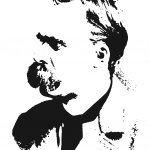A major business leader is bullish about the American economy in the short term, but he has big concerns about the future of the country.
Jamie Dimon, the C.E.O. of the investment banking behemoth J. P. Morgan Chase, has issued a long letter to stockholders that has gotten considerable attention outside the business world.
He is extremely confident that the post-COVID economy will grow dramatically. How could it not, what “with excess savings, new stimulus savings, huge deficit spending, more QE [quantitative easing], a new potential infrastructure bill, a successful vaccine and euphoria around the end of the pandemic.” He thinks the good times will last into 2023. But he warns against letting the coming success blind us to our nation’s underlying problems. “”Unfortunately, the tragedies of this past year are only the tip of the iceberg — they merely expose enormous failures that have existed for decades and have been deeply damaging to America.”
In addition to the usual charts and graphs and information about how the company has been doing–very, very well, by the way–Dimon addresses the bigger problems that businesses and the nation as a whole are facing. He sounds like a liberal in bemoaning inequality and calling for social justice, but he sounds like a conservative in bemoaning the loss of confidence in free enterprise economics and the dysfunctions of government. He goes on to think through some steps that the country might take to address some of these issues.
The letter is an interesting read (not that it was sent to me, proletarian stiff that I am, but it’s posted online). What struck me, though, in all of the issues he brings up, is his point that Americans have lost trust in their institutions. Specifically, he says, “Almost all institutions – governments, schools, media and businesses – have lost credibility in the eyes of the public. And perhaps for good reason.”
Singling out those four is insightful. Americans from all political persuasions have become cynical about the government, are frustrated with our underperforming, self-protecting educational establishment, no longer believe the news media, and are highly critical of big corporations.
There are efforts on the part of these institutions to restore their standing among the public, but these may do more harm than good. President Biden has said that he hopes to restore Americans’ faith in government, but in extending its reach into people’s lives and promising to solve problems that are arguably outside its competence, he risks alienating many Americans still further. Schools are trying to cover up their failure to educate poor children by shifting their emphasis to political advocacy. The news media has whiplashed from non-stop attacks on the previous president to sycophantic adulation of the new one, demonstrating their unreliability. And big corporations are trying to downplay their robber-baron capitalism by a surface embrace of leftist ideology, which is fooling no one.
If there is a broad consensus that these four institutions are not trustworthy, people of different political persuasions also distrust different institutions. Conservatives don’t trust Hollywood or Silicon Valley. Progressives don’t trust police or the church.
Some institutions still retain a measure of trust, though these have taken a beating. Most Americans trust their doctors, but the medical profession has created skeptics, due to its conflicting advice on COVID and ever-changing advice about what is healthy and what isn’t. Such continual revision is just how science works, but it has led many Americans to alternative medicine and to the internet as their main healthcare provider. Most Americans seem to support the military, though it too seems to be becoming politicized. Most Americans remain strongly supportive of the family, even though marriage and birth rates are declining.
Society is made up of institutions. If the members of a society repudiate their institutions, the social fabric threatens to come apart. Dimon sees the current anti-institutionalism as a herald of national decline.
On the other hand, it’s a fair question to ask, to what extent should we trust our institutions?
Luther defined idolatry not in terms of physical depictions of spiritual realities but as having other gods than the Triune deity revealed in Scripture. “What does it mean to have a god?” he asks in the Large Catechism. The answer has to do with what we put our faith in. What or whom do you trust above everything else? Whatever or whomever it is you look to for all of your good is your god.
A god means that from which we are to expect all good and to which we are to take refuge in all distress, so that to have a God is nothing else than to trust and believe Him from the [whole] heart; as I have often said that the confidence and faith of the heart alone make both God and an idol. (LC, First Commandment)
If you “expect all good” and “take refuge in all distress” from government–whether existing or projected–the government is your god, and your political preoccupations are idolatrous. If your “confidence” and your “faith of the heart” are in education, or even in your family, you are worshiping idols.
But then again, Luther taught that God has created human beings to inhabit certain “estates.” That is, certain divinely-established institutions–the church, the state, the family, along with the economic activity that sustains them–for human flourishing as social beings. Through these, God Himself is at work, caring for His creation by means of human vocations.
We should not look to these estates for all our good. But we should look to them for the good that they are intended to do. And they should do the good they are intended to do, rather than to go outside their bounds.
The government, the family, the schools, businesses are not capable of solving all of our problems and meeting all of our emotional and spiritual needs. Only God is capable of that. The government’s job is to protect its citizens so as to enable them to live their lives in peace. Totalitarianism is idolatrous and an offense against the other institutions, which an all-powerful government seeks to displace. Businesses are to provide goods and services to serve other people and so to make a living for those who are a part of it. Not to be the ultimate concern of a person’s life. That would be idolatrous.
Part of the reason we have become anti-institution is our radical individualism that does not recognize our need for and our obligations to other people. But the institutions themselves have fallen short of what they should be. Churches have become like businesses, families have become disposable, the media has lost its concern for truth, schools have given up on educating, etc., etc.
Bringing back our institutions means that they need to rediscover their purpose. And their limits.
And we also need to get a proper sense of the individual, which is also highly valued in Christianity. We’ll look at that next time.
Illustration: “Society” by Nithinan Tatah from the Noun Project. Creative Commons.












